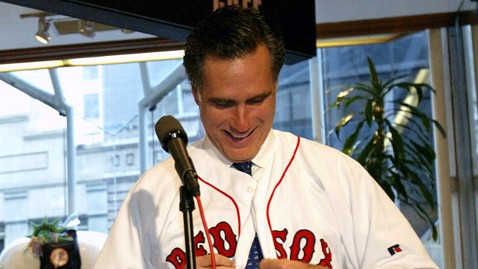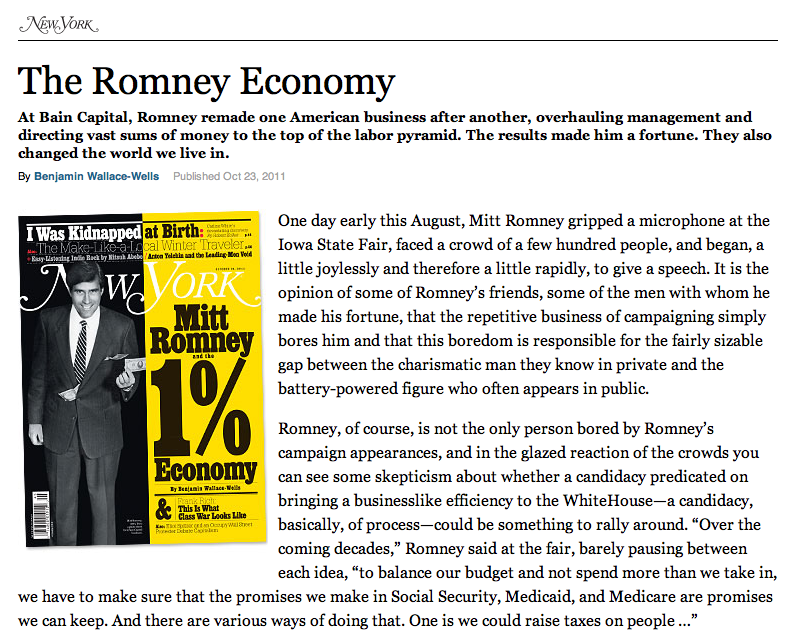Philip Klein, senior editorial writer for The Washington Examiner, wrote a piece titled, Romney’s false health care claims echo Obama’s. Klein attacks a few sound bites Mitt Romney gave at the recent Fox/Google debate while trying to explain his 2006 MA health care bill. Unfortunately, Klein ignores the larger context of what Romney is saying, which Romney amply provides in his book, No Apology.

In his effort to make Romneycare and Obamacare seem alike, Klein doesn’t deny the differences between them. Moreover, he doesn’t even mention the differences. Romney didn’t cut Medicare/Medicaid, didn’t impose insurance price controls and didn’t do a host of other things Obama did in his 2,700 page bill. Romney’s bill is only 72 pages.
And as Marco Rubio pointed out in an interview for National Review during his 2010 campaign in which he obtained Romney’s endorsement, Romney’s plan didn’t raise taxes or add to the deficit, and is a state rather than federal plan.
“It’s a work in progress,” Rubio says, speaking of the Bay State program. “There are major distinctions between that and what Obama is trying to do in Washington. For one, it didn’t raise any taxes. Number two, it is not adding to our deficit. That is my biggest objection to Obamacare, although there are many others. My number-one objection to Obamacare is that we can’t afford it, even if it was the greatest idea in the world.”
“Florida and Massachusetts are very different places,” Rubio continues. “All I would say to you is that states were designed to be laboratories for creative thoughts and ideas. That’s what the Framers of our great republic intended. They wanted the states to be the places that came up with innovation and competition. And I’ll tell you what, if Massachusetts gets it wrong and Florida gets it right, people will move to Florida, and businesses will move to Florida, and vice versa. There are just major distinctions between what’s happening in Washington and what I hope states will do. Like I said, what I’m not in favor of is what Barack Obama has done, which is to raise taxes and add to the federal deficit in exchange of taking a step toward a single-payer system in America.”
Most importantly, Romney’s plan has slowed rising health care costs in MA, despite flawed studies claiming otherwise.
Klein cites a number of quotes from President Obama regarding his own health care plan, comparing them to selected statements from Romney, made during the debate. For our purposes, Obama’s statements are not relevant. Whether or not Obama is being truthful about his own plan has no bearing on the truth of Romney’s statements.
Rather than admitting that Romney’s 30 second debate answers are not intended for a hyper-technical audience the way his book is, Klein claims Romney is “consistently making a series of blatant lies.” That is a serious accusation, so let’s look at the first of Romney’s statements which Klein is referring to (from the official debate transcript):
ROMNEY: Let me tell you this about our system in Massachusetts: 92 percent of our people were insured before we put our plan in place. Nothing’s changed for them. The system is the same. They have private market-based insurance.
Admittedly, the second half of Mitt’s statement is not technically accurate unless taken in the context of the first sentence. Romney wasn’t saying their lives haven’t changed in any way at all, but was addressing the primary concern people have expressed to him, which is the mandate to own insurance. Mitt appears to be minimizing that particular concern by explaining that since most people in MA already had insurance, the new law was only telling them to do something they were already doing.
But Klein doesn’t see it that way:
Neither bill literally says that people have to drop their coverage, but both Obamacare … and Romneycare … effectively make people lose their current coverage. For one thing, both mandate that individuals purchase insurance, and once the government does that, it has to define what qualifies as “insurance.” Obamacare employs the phrase “minimum essential coverage,” where as in Romneycare, it’s called “minimum creditable coverage” (see Chapter 111M, section 1). In both cases, anybody who does not have a qualified insurance policy, therefore, has to obtain one that meets the government-imposed standards, or pay a fine.
The first fact to defeat Klein’s argument is that the coverage mandates are on insurance companies, not on policy holders. So his claim that people lost their coverage and had to switch is untrue.
The second problem with Klein’s argument is that he complains about “minimum essential coverage,” however states routinely “define what qualifies as ‘insurance.'” States regulate insurance just like they regulate other companies. Texas, for example, has mandated benefits for insurance coverage, which it applied universally as recently as 2004, at which point the state implemented “consumer choice plans” which do not contain all of the state mandated benefits but must be individually approved by the state. Regulations like “minimum essential coverage” were nothing new for MA. As Romney accurately said, “the system is the same.” Regulatory changes are inherent in that system.
Perhaps Klein is thinking of how the MA legislature expanded regulations further by mandating that “the division shall include within its covered services for adults all federally optional services that were included in its state plan or demonstration program in effect on January 1, 2002.” Romney vetoed this in the bill but the legislature overrode the veto. In his book, Romney explains, “I would reinstitute my vetoes of the legislature’s additions. Among these, one of the most significant is my conviction that the state should not mandate which benefits must be included in health insurance policies: Consumers should be free to choose which benefits they want” (PB, p. 194).
It’s hard to argue that someone supported something they vetoed. But Klein tries anyway, and in the process tips his hand about his lack of objectivity:
In the past, Romney’s tried to tout the fact that he vetoed some of the benefit mandates but was overridden by the legislature. That’s a disingenuous argument, because he spent years crafting the bill, signed it with a smiling Ted Kennedy at his side, touted it publicly, and issued symbolic vetoes knowing that they would be overridden, just to give him some conservative cover. This argument would be the equivalent of a Republican Senator having worked with Democrats for a year to pass Obamacare, voting it out of committee, giving it the 60 vote threshold it needed to break a filibuster, and then voting against final passage and trying to use that final meaningless vote to make a case to primary voters.
Contrary to Klein’s claims, the legislature in MA continued making changes to the bill throughout the entire process. His U.S. Senate analogy fails because Romney always opposed the provisions he vetoed and never did anything comparable to voting them out of a Senate committee. It would be more accurate to say the Senate sent the provisions in the first place knowing Governor Romney would not be able to stop them from overriding his vetoes (although in the case of two of the vetoes, the legislature was not able to garner enough votes to override).
Klein continues his analysis:
“Furthermore, both plans create incentives for businesses to drop employer-based private insurance and dump workers on the government exchanges. We’ve seen rumblings of this as Obamacare moves closer to implementation, and last year the Boston Globe reported the following news: ‘The relentlessly rising cost of health insurance is prompting some small Massachusetts companies to drop coverage for their workers and encourage them to sign up for state-subsidized care instead, a trend that, some analysts say, could eventually weigh heavily on the state’s already-stressed budget.’
“So, Romney’s claim in last night’s debate is just as dishonest as when Obama made the same claim to the American people two years ago.”
Romney never denied that our country is in an economic crisis. Small businesses are struggling and cutting wages and benefits. But the facts show that Romney’s health care plan has lowered the rate of cost increases.
And most importantly, Klein again neglects to crack open Romney’s book:
“When the reform was passed … we required everyone who received subsidized insurance to pay a fair share of their premiums–the new liberal administration decided that some people should get their insurance for nothing. Imagine the additional cost to the state of such a decision.” Romney further noted, “elections have consequences.” (PB, p. 194)
Now let’s look at Klein’s next example in the alleged “series of blatant lies”:
“ROMNEY: We had 8 percent of our people that weren’t insured. And so what we did is we said let’s find a way to get them insurance, again, market-based private insurance. We didn’t come up with some new government insurance plan.”
Indeed, the Massachusetts Connector is not an insurance plan. It just helps people find private insurance companies, and when necessary diverts medicaid funds for that purpose. Ronald Reagan proposed a plan to do something similar, with Medicare:
“The plan expands opportunities for Medicare beneficiaries to use their benefits to enroll in private health plans as an alternative to traditional Medicare coverage”
– Ronald Wilson Reagan, February 28, 1983, transmitting to Congress his Health Insurance Reform program
Now that we’ve heard from Reagan, let’s hear from Klein:
“It’s not clear if by “new government insurance plan,” Romney meant a “public option,” but either way, that’s moot, because the idea wasn’t a part of the final version of the national health care bill that Obama signed, either. Yet what both plans do have in common is a government-run health care exchange, in which individuals use government subsidies to purchase health insurance that meets requirements set by government-appointed officials.”
As we have already discussed, every state government sets requirements for private health insurance. If Klein is claiming that these constitute a “new government insurance plan,” he would have to apply that to the other states as well. Or perhaps he is claiming that medicaid is the “new government insurance plan,” but Romney didn’t create medicaid. It’s been around for a long time.
Now for the last of the alleged “blatant lies” cited by Klein:
“ROMNEY: Our plan in Massachusetts has some good parts, some bad parts, some things I’d change, some things I like about it. It’s different than Obamacare.”
Klein’s claim:
“Romney says there are some ‘bad parts,’ but won’t specify what they are.”
No. Klein just made that up. Klein is making the same mistake as our friends at RedState. And clearly Klein did not feel the need to do any real research before writing his attack. In his book, No Apology (PB), Romney explains some aspects which he once supported but no longer does, and has consistently opposed many aspects which were foisted upon the health care plan against his desires.
If Klein would actually learn more about Romney, he might like him.






 As the Perry campaign continues a downward fall, buzz over Newt Gingrich is rising in its place. Could a surprise still happen? Around here we are starting to make predictions…
As the Perry campaign continues a downward fall, buzz over Newt Gingrich is rising in its place. Could a surprise still happen? Around here we are starting to make predictions…


